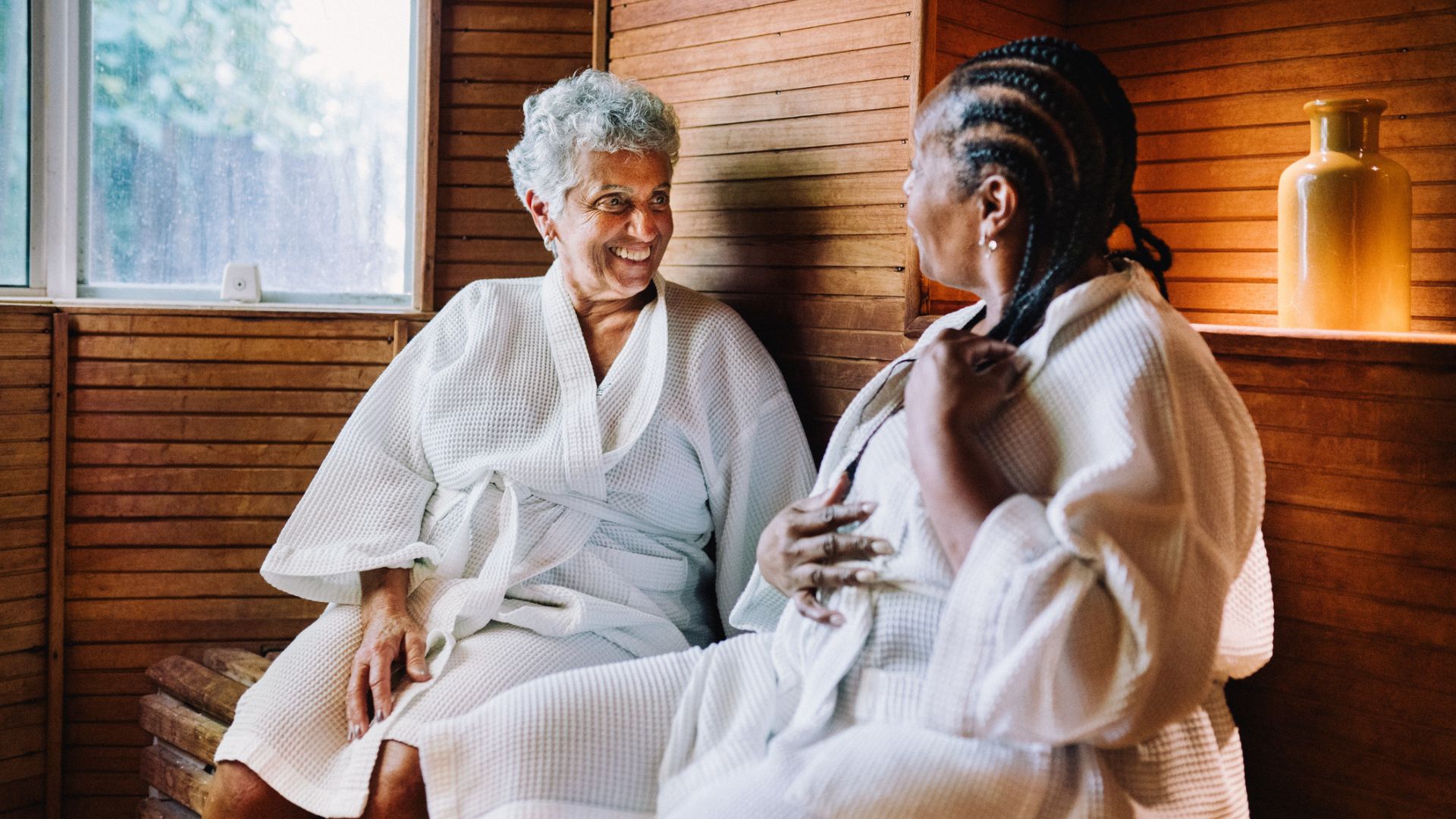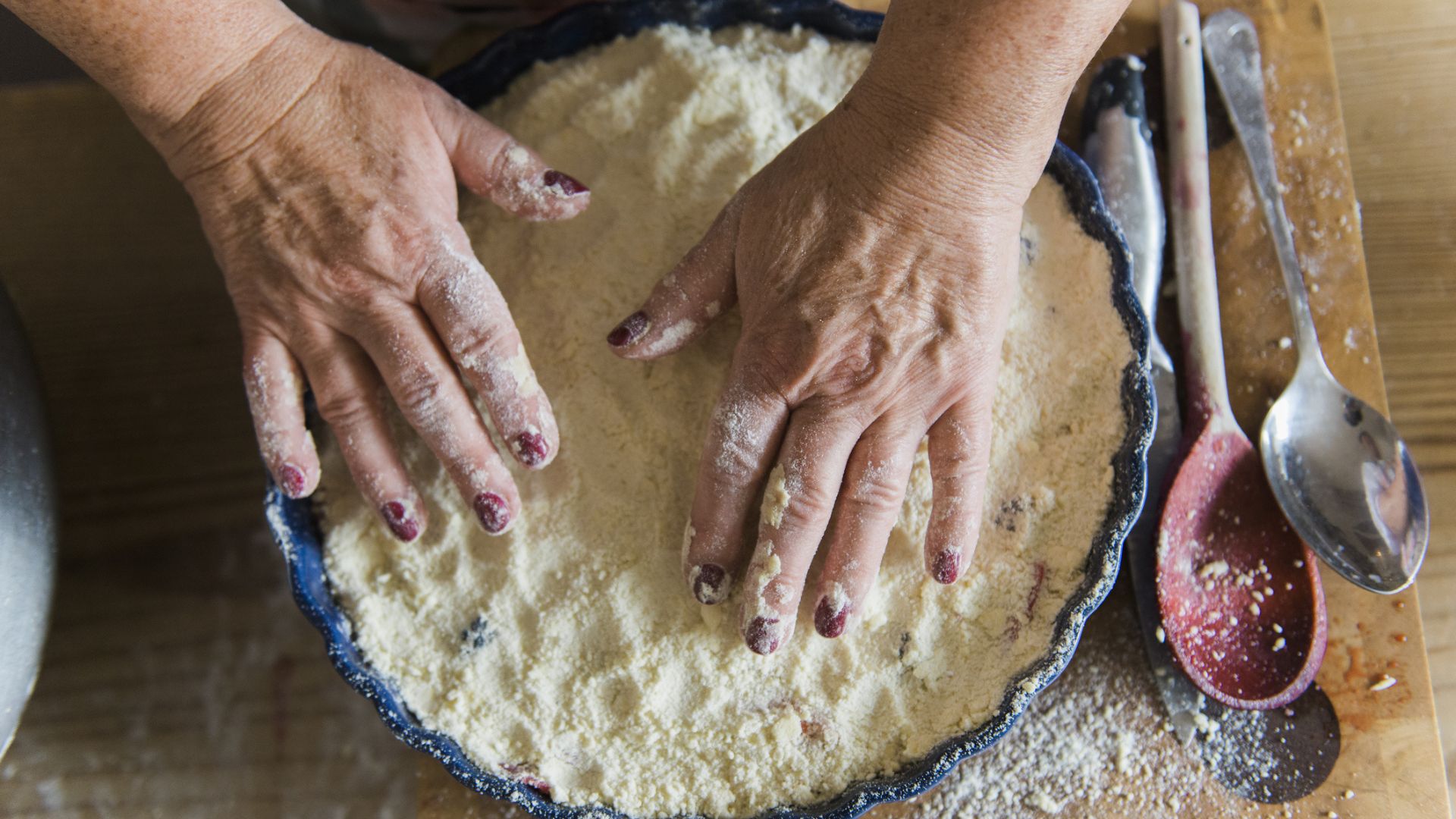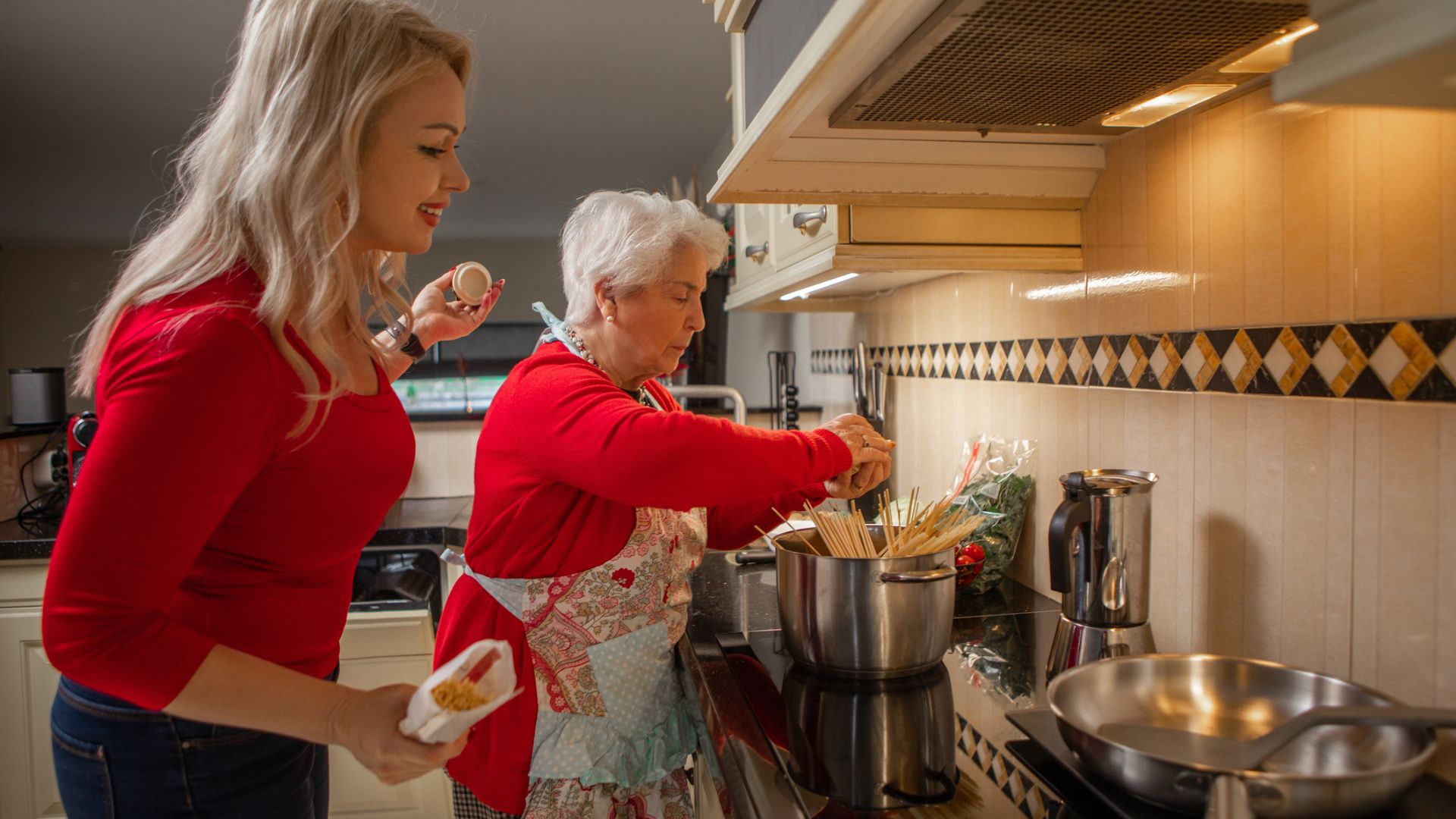How to charm your in-laws: the ultimate guide to keeping the peace
Discover how to strengthen your in-law relationships, one thoughtful gesture at a time


Be it your mother-in-law, daughter-in-law, sister-in-law, whoever-in-law, building a strong relationship with your in-laws can be a delicate dance; equal parts grace, effort, and knowing when to step back.
In Why Marriages Succeed or Fail, Dr John Gottman identified in-law troubles as one of the top predictors of marital issues – so it's important to work on this relationship.
Whether you're navigating a new family dynamic or simply looking to strengthen existing bonds, small gestures often make the biggest impact, so here are some charming ideas for connecting with your in-laws in a way that feels natural and sincere.
How to charm your in-laws
Explore a shared hobby

Whether it’s a shared love of period dramas, a passion for painting, or a favourite author you both can’t put down, discovering a mutual interest is one of the fastest ways to build connection. These common threads help turn polite conversation into real bonding. As experts Amy Torres, Program Coordinator and Lisa Schainker, Extension Assistant Professor at Utah State University advise, “Look for shared interests or values with your in-laws to help build strong connections.” And if differences do crop up, as they often do, focusing on shared values can help you find solutions that work for everyone.
Celebrate their wins

Whether it’s retirement, winning a school football match, or simply sticking with a yoga class they were nervous to try, showing genuine enthusiasm for your in-laws’ achievements helps deepen your connection. Everyone wants to feel seen and celebrated, and your encouragement reinforces that. As Dale Carnegie notes in How to Win Friends and Influence People, praise is powerful. He quotes Charles Schwab, who said, “I have yet to find the person, however great or exalted in their station, who did not do better work and put forth greater effort under a spirit of approval than they would ever do under a spirit of criticism.” Celebrate their efforts, however small, and you'll find you become someone they genuinely enjoy being around.
Compliment their role in the family

A heartfelt compliment can go a long way in building bridges with your in-laws. Whether it’s acknowledging how well they raised your partner or complimenting a son- or daughter-in-law on their warmth or humour, a simple line like, “You’ve done a wonderful job” can soften even the frostiest heart, as sincere praise makes people feel valued, which is often the first step toward connection. As Dale Carnegie puts it in How to Win Friends and Influence People, “Praising people, making an effort to know their interests and chat about them makes people feel important... If you make people feel important, how you walk through the world will be an exponentially more pleasant and incredible experience.”
Take note of their style

Paying attention to your in-laws’ tastes, whether in clothes, home décor or even food, shows that you see them as individuals, not just family by default. When you're out shopping and they mention something they like, make a mental note (or better still, jot it under their birthday reminder on your phone). If you spot something later that suits their style, consider picking it up, or when they come over, cook a meal you know is their favourite. These thoughtful details add up and make people feel known, which is one of the most powerful ways to connect.
Sign up for the woman&home newsletter
Sign up to our free daily email for the latest royal and entertainment news, interesting opinion, expert advice on styling and beauty trends, and no-nonsense guides to the health and wellness questions you want answered.
Brush up on their interests

Whether it’s birdwatching, baking or backing the local football team, showing curiosity about your in-laws’ hobbies can open the door to stronger relationships. You don’t need to become an expert; just brushing up on a few basics or having a handful of conversation starters up your sleeve can work wonders. As Barbara Greenberg, Ph.D., wisely says in her Psychology Today article, “Take an interest in the activities that your in-laws enjoy. This will make them feel loved and accepted. And, if it doesn't, then at the very least you will know that you have tried. My experience has been that everyone loves the opportunity to talk about the activities that energise and/or soothe them. We all know that it is a joy to be listened to.”
Include them in family photos

It might seem like a small gesture, but inviting your in-laws to be in family photos, whether it’s at a birthday, Christmas lunch, or casual weekend outing, can mean more than you realise. It shows they’re a valued part of the bigger picture (literally and emotionally). Whether you print and frame it, or just share it in a family WhatsApp group, these moments help foster a sense of belonging, and ultimately are a quiet but powerful way to say: you matter.
Start a new family tradition

While honouring old traditions definitely matters, making space for new ones can be just as meaningful. So why not invite your in-laws to be part of something unique to your shared family life? For instance, it could be going on a Boxing Day walk, watching the same film every Easter, or making birthday cakes and balloon arches together. Ultimately, these rituals, no matter how small, give them a stake in the present, not just a connection to the past.
A simple text goes a long way

You don’t always need a big reason to reach out, as a quick, “Saw this and thought of you” message, a funny meme, or a snapshot of your day, can keep your in-laws feeling connected to your everyday life. Clinical counsellor Beth Hoff suggests, “Text her a cute photo or video of your kids or family throughout the week... We actually created a text group that includes both sets of parents and send little updates, photos and videos several times a week. They all love it!” It’s a gentle, low-pressure way to stay in touch that reminds them they’re in your thoughts, even when life gets busy.
Respect their rules

Every household has its own unspoken code: no shoes indoors, coasters on every surface, or ensure the door is closed correctly for fear of the partially blind, elderly cat escaping. While these habits might differ from your own, being mindful of them shows a quiet respect. It’s not about agreeing with every rule, but recognising that you’re a guest in their space, happy to show that you value their comfort and care about them enough to honour their way of doing things.
Enjoy a spa day

No matter how chilled someone appears, we all carry stress, whether it’s the fallout from a tough week, an old argument that still lingers, or just the weight of life’s daily demands. So a spa day, or even just an at-home pamper session with face masks and herbal tea, can be a beautiful way to press pause and reconnect. Sharing moments of true relaxation helps you rediscover the best version of yourself, and lets your in-laws see and experience that side of you too.
Remember their friends’ names

Remembering the names of the people your in-laws care about, like “Linda from the bridge club”, “childhood pals Charlotte and Claire”, or "Sheila who cuts your hair at the hairdressers", really shows that you’re listening to them and the stories they chose to share. Ultimately, remembering something simple as someone's name, lets them know you care not just about them, but about their wider world, too. And it's these small moments of recall that can leave a big impression.
Ask for their signature recipes

Food is a universal love language, and sharing recipes can be a surprisingly powerful way to build a bond. If your in-law is known for a signature dish, be it their signature sauce, Grandma’s apple crumble or unbeatable lasagne – ask for the recipe. Not only does it show respect and admiration, but it invites them to share a piece of their personal history. In return, you might like to offer up one of your well-received recipes if they’ve shown interest in it in the past. It’s a gentle exchange that can spark conversation, memories, and a deeper connection, all over a plate of something delicious.
Let them shine

Even if you’re something of a star baker or have a flair for interiors, there’s real grace in letting your in-laws shine in their space. It’s not about dimming your light, think of it rather as recognising when to share the spotlight. Overstepping or unintentionally “one-upping” them can create tension where there doesn’t need to be any. Sometimes, the best way to win over others is not to prove yourself right or best, but to give others the recognition they crave.
Speak well of them

Kind words often have a way of circling back, so if you’ve said something lovely about your in-laws, there’s a good chance they’ll hear about it. A comment like “She’s always so stylish” or “He really knows his cars” can work wonders in building goodwill. On the flip side, less flattering remarks tend to travel too, often further and faster than you’d like. The old adage holds true: If you can’t say something nice, don’t say anything at all. In family dynamics, it pays to look for the best in people, and voicing positives can strengthen bonds more than you might expect.
Offer to do the washing up

It might seem like such a small gesture, but jumping up to help clear the plates after a meal or offering to do the washing or drying up really speaks volumes. It shows the family that you’re not just a guest; you’re part of the team. Unlike some household chores, washing or drying up tends to be universally accepted as fair game for guests, making it the perfect act of politeness without stepping on toes. Bonus points if you manage to rally others into helping too!
Always remember birthdays

It might sound simple, but remembering someone’s birthday speaks volumes. It shows care, thoughtfulness, and effort, three qualities that go a long way with in-laws. Jot key dates into your diary, set recurring reminders on your phone, or use online card services like Moonpig, which will ping you an email to remind you of upcoming birthdays, to stay ahead of the game. Better still, add a note about their favourite things, so whether it’s a book genre, a garden bloom, or a penchant for pralines, when their birthday rolls around, you’ll already have gift ideas at your fingertips.
Help out with odd jobs

Sometimes, the simplest way to build a bond is by lending a hand. If your in-laws are time-poor and you’ve got a spare afternoon, offer to help with something practical, be it mowing the lawn, picking up a prescription, or sewing up the hem on your niece’s prom dress. If you’ve got a skill that others might find useful, offer it freely. Thoughtful acts of service speak volumes; not just about your helpfulness, but your willingness to be part of the family.
What’s more, as an educational article on MentalHealth.org explains, helping others is a win-win for everyone, “Evidence shows that helping others can also benefit our own mental health and wellbeing. For example, it can reduce stress as well as improve mood, self-esteem and happiness. There are so many ways to help others as part of our everyday lives. Good deeds needn’t take much time or cost any money.”
Give them a compliment when they least expect it

A well-timed, genuine compliment that comes straight from the heart can linger long after it’s delivered, especially when it goes beyond surface-level niceties. Instead of the usual “Oh you look nice today,” try something more personal, like, “I really admire how calm you are under pressure,” or “Your home always feels so welcoming.” These deeper compliments show you truly see and appreciate them, not just for how they appear, but for who they are.
Ask about their stories

Most people light up when given the chance to share their stories, especially when those stories have been tucked away for years. In particular, ask elder in-laws about their childhoods, how they met their partner, and favourite family traditions. It’s not just about nostalgia (though that’s a lovely bonus), it’s more about getting to know them beyond their title in the family. These conversations often reveal humour, wisdom, and context that deepen your appreciation for who they are, and as such, where your partner came from. Plus, everyone likes to feel listened to. This simple act of being interested is surprisingly powerful.
Send a handwritten thank-you note

In a world of WhatsApp messages and heart emojis, the charm of a handwritten note stands out more than ever. Whether your in-law has baked you a homemade cake, whipped up a Sunday roast, or even just passed on a drawing from one of the grandchildren, taking a moment to write and post a thank-you card shows grace, gratitude, and old-school good manners. Talking about mother-in-laws, clinical counsellor Beth Hoff says, “Send her a card just because. Thank her for the role she plays in your family’s life.” A few kind words on paper can leave a lasting impression, no matter which in-law you’re writing to, and help nurture that bond beyond the everyday.
Respect their traditions

Every family has its own set of customs, whether it’s how the turkey’s carved, when presents are opened on Christmas Day, or how holidays are celebrated. Sometimes, those traditions may come from a different faith, culture or country entirely. You don’t have to adopt them as your own, but showing respect for their significance builds enormous goodwill. Ask questions, listen, and join in when you can. Even small gestures like taking an interest in a festival or helping with a traditional dish signal warmth and openness. You’re not just recognising their way of doing things; you’re honouring the roots and values behind them.
Invite them to occasional outings

Sometimes, it’s not what you do together; it’s the fact that you’ve asked. Extending an invitation to browse a garden centre, catch a matinee, or go for a walk with a café stop at the end can mean the world. The activity itself is almost secondary to the sentiment, as what’s important is the fact you’re making time and space for connection. As clinical counsellor Beth Hoff suggests when talking about her own relationship with her mother-in-law, “Invite her to do something just the two of you: going shopping, out to lunch, coffee date. Ask her questions to get to know her and be willing to share something about yourself.” So whether it’s your daughter-in-law, a sister-in-law or your partner’s dad, reaching out helps nurture trust, shows appreciation and reminds them they’re not just family, they’re wanted company too.
Spend quality time together

Whether it’s a family meal or getaway, Christmas celebrations, or cosy Friday film nights, carving out time to include your in-laws helps them feel like a real part of your family life, not just guests on the sidelines. Licensed therapist Leslyn Kantner notes on TikTok, and reported by The Independent, that many women are often expected to take on the role of ‘family social director,’ but stresses the importance of balance, “Ensure plans are made to include both your husband’s and your own family equally.” While social norms are shifting, being mindful of inclusion, on both sides, goes a long way in keeping the peace and fostering deeper, more meaningful relationships.
Let them get to know you

Relationships with in-laws can often feel defined by roles: mother-in-law, daughter-in-law, sister-in-law, step-parent, but real connection comes when you go beyond the label. Let them see who you are; your passions, quirks, stories, even the odd vulnerability. You don’t have to overshare, but being open and human invites trust. As with any relationship, it’s a two-way street and sometimes, the more you reveal, the more space you create for a genuine connection to bloom.
Allow them to feel needed (even when you have it covered)

Asking your in-laws for advice, or even a small favour, can go a long way. Whether it’s how to get red wine out of a carpet, a trusted restaurant recommendation, or help picking something up, it gives them a role and reminds them they’re still valued. It’s not about dependency; it’s about inclusion. As psychologist Barbara Greenberg, Ph.D., explains in an article for Psychology Today, “We all want to feel necessary... individuals of all ages do better when they are needed and appreciated.” With older generations, they’ve likely been in your shoes at some point, navigating in-law dynamics themselves. That shared experience can be a quiet but powerful bridge, so give them the chance to contribute, even if you can manage just fine on your own.
Be a good hostess

A quiet coffee and a slice of cake, or a homemade lunch - inviting your in-law over doesn’t need to be a grand dinner party affair, it’s ok to keep things simple. It’s the invite that shows that you’re not just a passive participant in the relationship, you’re actively investing in it. One-on-one time allows space for more meaningful conversations, away from the bustle of family gatherings. It also flips the dynamic, letting you play host and making them feel special.
Make a fuss of their milestones

Everyone loves a milestone, big or small, so when your in-laws celebrate an important moment in their lives - make a fuss of them! Be it an anniversary, landing a new job, moving house, graduating from university, or welcoming a new baby; make a point of acknowledging it. A card, a message, or a toast at Sunday lunch can go a really long way. Thoughtful gestures like these show that you’re paying attention and that you care about what matters to them.
Be a bridge, not a barrier

If your partner has a complicated or strained relationship with their family, try to be the bridge, not the barrier. Your presence can either soothe tensions or unknowingly add to them. Relationship coach Leslyn Kantner explains on her TikTok, and reported by The Independent that “It can feel like there is competition between a man’s mother and his wife... But they are different kinds of love.” Lesley explains that romantic love builds a new family, while parental love belongs to the one who raised them, and for some mothers, that shift can feel like a loss. While it’s not your job to fix your partner’s relationship with their parents, you can play a positive role by being kind, respectful and staying out of any drama that unfolds.
It's good to laugh

Who doesn't love a good old laugh?! Not only does it release a rush of feel-good endorphins but humour is one of the quickest ways to break down a person’s barriers, whether it’s a shared family joke, a funny meme you know they’ll appreciate, or a silly story from your week, laughter has a way of making relationships feel more natural and less formal. It reminds your in-laws that beneath the roles and expectations, you’re just human, trying to connect and enjoy their company.
Small tokens make a big difference

Turning up empty-handed might not bother your friends, but when it comes to in-laws, a small gesture can go a long way. Whether it’s their favourite type of wine, a homemade cake, or a bunch of flowers, it’s not really about the gift itself, it’s about acknowledging the time, thought and effort they’ve put into hosting you. And for some people, that kind of gesture speaks louder than words. As clinical counsellor Beth Hoff explains, “One day, out of the blue, I had a realisation. My mother-in-law’s love language is gifts! For multiple years, I had been waiting for her to verbalise some sort of approval of me, and it never came. But instead, she showered me with gifts. I suddenly understood that she was reaching out to me in a way that she understood and I had been missing it.”
Grace under pressure

Let’s face it, tensions can often bubble up in any family dynamic, but staying calm, gracious, and unflappable is often the most powerful move of all. You don’t have to win every disagreement to maintain harmony; in fact, knowing when to step back, let things breathe, or choose not to engage is a strength in itself. As experts at Utah State University explain, “If disagreements arise, maintain a calm and respectful demeanour. Avoid heated arguments or blaming, as this will only escalate tensions.” Just breathe, and remember not every gesture hides a deeper meaning, not every conversation needs a comeback, and not every relationship needs to be perfect.
Uplift, don’t undermine

Even if it’s meant in jest, grumbling about your other half in front of their family, especially their parents, can be risky territory. What you may see as light-hearted venting, they may take as criticism, or worse, as a dig at their parenting skills. As licensed therapist and relationship coach Leslyn Kantner points out on her TikTok, and reported by The Independent, “If I’m complaining my partner doesn’t do the dishes to a woman who never asked him to do the dishes, it might be challenging for her to understand or validate... They might think, ‘Are you saying I did a bad job of raising him?’” Instead, save any serious unloading for trusted friends!
Natalie Denton is a freelance writer and editor with nearly 20 years of experience in both print and digital media. She’s written about everything from photography and travel, to health and lifestyle, with bylines in Psychologies, Women’s Health, and Cosmopolitan Hair & Beauty. She’s also contributed to countless best-selling bookazines, including Healthy Eating, The Complete Guide to Slow Living, and The Anti-Anxiety Handbook.
-
 Aldi's affordable bedding is actually made by my favourite sleep brand - it's got more than your duvet covered
Aldi's affordable bedding is actually made by my favourite sleep brand - it's got more than your duvet coveredAldi's Anti-Allergy Bedding has arrived in the middle aisle and it's more affordable than the best mattress toppers, duvets, and mattress protectors out there
By Laura Honey Published
-
 Unforgettable date ideas to make a great first impression or rekindle romance
Unforgettable date ideas to make a great first impression or rekindle romanceForget the same old first date formula - these unforgettable date ideas will leave them thinking about you long after you go home
By Natalie Denton Published